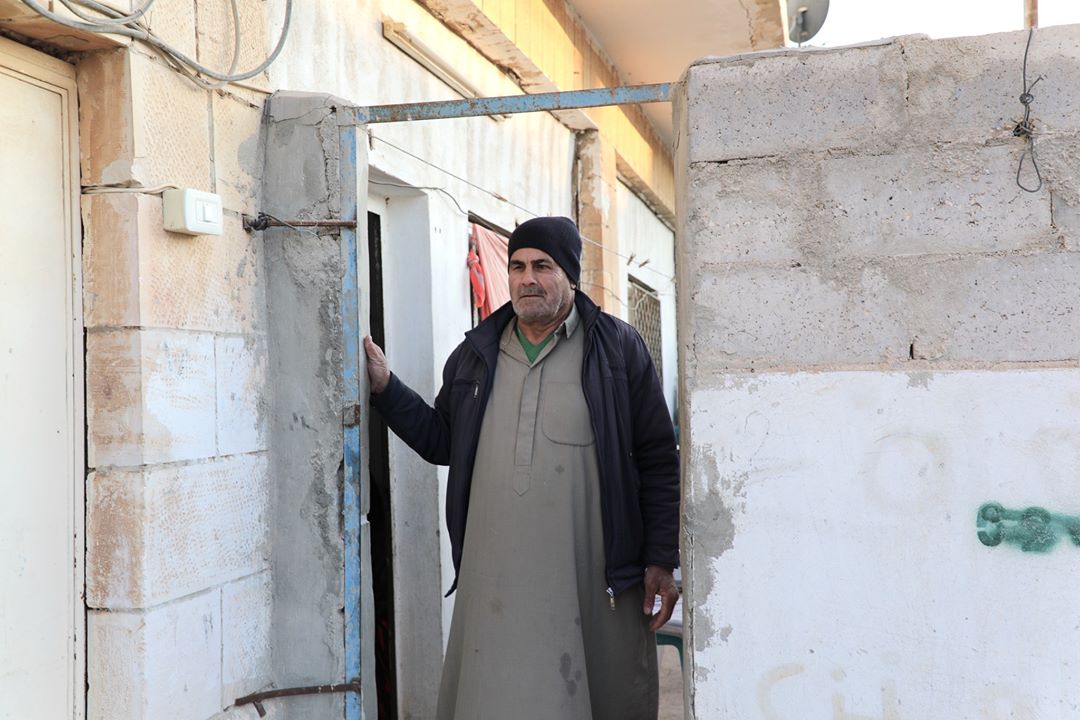“We are alone. My eldest son died during the conflict in Syria and we have lost contact with the rest of our family.”
Um Waheeb, her mobility has suffered since a car accident.
© UNHCR/Lilly Carlisle
Sitting on a flimsy plastic chair on the edge of his porch on the outskirts of the Jordanian city of Mafraq, Ahmed Abdel-Majid stares out at his neighbours’ children playing football in the street. A gaze of longing crosses his expression as he looks at a scene that was once all too familiar, when his children used to run round the streets with their friends back home in Daraa, Syria.
Now though, at 67 years of age, Abu Waheeb as he is otherwise known, explains that it is just him and his wife.
“We are alone. My eldest son died during the conflict in Syria and we have lost contact with the rest of our family.”
Walking into their one room ground floor apartment, the hardship of everyday life is immediately visible. Dark and damp, with no heating, blankets are piled up high to provide just a little bit of warmth. A small radio is perched in the corner and Abu Waheeb indicates that this is now his main source of news, asking about a report he heard earlier in the day that rain was forecast for the next day.

After arriving in 2013, they never expected they would stay in Jordan this long.
“We’re tired from everything,” Abu Waheeb complains. “Physically and financially.”
Sighing, Um Waheeb picks up a carrier bag full of medication.
“This is what I have to take every day,” she says and begins to count out the multiple pills she is due to take at lunchtime.
Just six months earlier, she was injured in a car accident when a fruit truck lorry sped round the corner while she was walking back from the shops. After spending one month in hospital, multiple surgeries and two hip replacements later, Um Waheeb is now back home but her mobility has been significantly hindered.
“I used to do all the cooking, but now I can’t stand up for long periods of time,” she says. “Even making tea is difficult.”
Trying to find a bit of light in their dark situation, Abu Waheeb jokes that he never thought he would learn a new skill at his age, but the dark circles under his eyes and constant frown speak a different story.
Like many other Syrian families, after nine years of the crisis, their savings are completely depleted. They have no pension, no family to support them through their retirement. Instead, Abu Waheeb has to go out and find work where he can, on farms and picking fruit during the summer months.

A little bit of relief comes through UNHCR’s cash assistance which is enabled through EU funding. Every month they receive around 200 Jordanian dinar (around €250) to support with their expenses but half of that automatically goes towards their rent. In addition, this month their landlord has requested they pay the next three months’ rent up front to guarantee their stay for the next year. Abu Waheeb shakes his head as he tries to work out how they will be able to afford it.
Sadly, however, their situation is not unusual, 80 per cent of Syrian refugees in Jordan residing outside camps live below the poverty line. Elderly refugees are particularly vulnerable, relying on family to get by – and when they are alone, on organisations such as UNHCR.
Abu Waheeb struggles to know what the future will hold.
“Tomorrow will be harder than today,” he says. “There will be tougher days. Or maybe it will be better. We don’t know.”
Find out more about EU humanitarian aid in Jordan.
Share on Facebook Share on Twitter